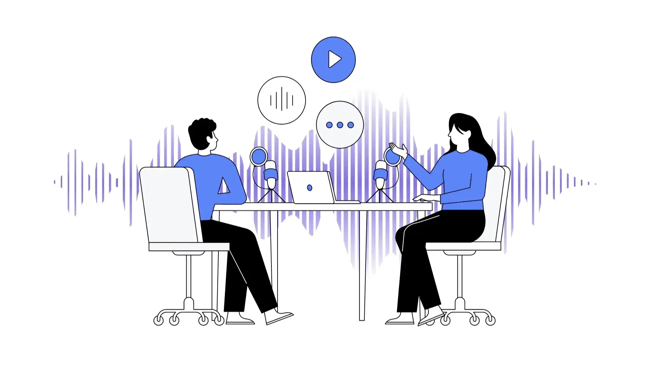Podcast Marketing 101: Turning Listeners into Customers
Unlock the power of audio to build relationships, drive conversions, and boost your bottom line

What is a Podcast?
At its core, a podcast is a digital audio series, released in episodes, that covers a wide array of topics. Think of it as your favorite radio show, available on demand, anytime, anywhere. Podcasts can be educational, entertaining, informative, or a captivating blend of all three. From true crime investigations to insightful interviews, comedic banter to in-depth discussions on niche hobbies, the podcasting world offers a rich tapestry of content catering to every imaginable interest.
The beauty of podcasts lies in their accessibility and convenience. Listeners can tune in while commuting, exercising, cooking, or simply relaxing at home. This intimate listening experience fosters a sense of connection and engagement that's hard to replicate through other mediums–and the numbers speak for themselves.
-
Over 2 billion people worldwide listened to podcasts in 2023.
-
There are over 3 million podcasts available, covering a diverse range of topics and genres.
-
The average podcast listener consumes 7 different shows per week.
-
Podcast listeners are highly engaged, with 80% listening to most or all of each episode.
These statistics paint a clear picture: podcasts have captured the hearts and ears of a massive global audience, presenting a golden opportunity for businesses to tap into this engaged and receptive listener base.
What is Podcast Marketing?
Podcast marketing is the strategic utilization of podcasts to achieve specific business goals. It involves creating, distributing, and promoting audio content that resonates with your target audience, subtly weaving in your brand's message and values. It's about leveraging the power of storytelling, conversation, and thought leadership to build brand awareness, cultivate trust, and ultimately drive conversions.
Podcasts offer a unique platform for brands to connect with their audience in an authentic and engaging manner. Unlike traditional advertising, which can often feel intrusive or disruptive, podcast marketing invites listeners into a conversation, fostering a sense of intimacy and trust. This personal connection allows brands to showcase their personality, share their story, and build relationships with listeners in a way that's both meaningful and memorable.
The benefits of podcast marketing are vast and varied. From boosting brand recognition and generating leads to driving website traffic and establishing thought leadership, podcasts offer a multi-faceted approach to achieving marketing success.
As we delve deeper into this guide, we'll uncover the full spectrum of possibilities that podcast marketing has to offer, empowering you to turn listeners into loyal customers and brand advocates.
How Podcast Marketing Works
Podcast marketing isn't just about creating great audio content; it's a strategic process that involves captivating your audience, building relationships, and ultimately guiding them toward becoming loyal customers. Here's a breakdown of how it works.

Captivate and Connect
The first step is to create a podcast that resonates with your target audience. This means identifying their interests, pain points, and aspirations, then crafting content that provides value and entertainment.
Whether through insightful interviews, compelling storytelling, or expert advice, your podcast should captivate listeners and keep them coming back for more. Remember, building a loyal audience is key to successful podcast marketing.

Establish Trust and Build Relationships
Podcasts offer a unique opportunity to humanize your brand and connect with your audience on a personal level.
The intimate nature of audio allows listeners to feel like they're having a conversation with you, fostering a sense of trust and rapport. Use your podcast to share your brand's story, values, and personality, and engage with your listeners through Q&A sessions, social media interactions, or even live events. The stronger the relationship you build, the more likely listeners are to consider your products or services.

Subtle, yet Effective Promotion
Unlike traditional advertising, podcast marketing focuses on subtle promotion that seamlessly integrates with the content. This can include mentioning your products or services in a natural way, offering exclusive discounts to listeners, or featuring guest experts who can subtly endorse your brand.
Additionally, strategic calls to action, such as directing listeners to your website or social media pages, can encourage further engagement and lead generation. Remember, the goal is to provide value first and foremost, while gently guiding listeners towards taking action.
By focusing on these three key elements - captivating content, building relationships, and subtle promotion - podcast marketing can be a powerful tool for driving conversions and boosting your bottom line.
The Benefits of Podcast Marketing
Podcasts offer a wealth of benefits for marketers, extending beyond mere entertainment. They possess the unique power to transform casual listeners into engaged customers, brand advocates, and even revenue generators.
Targeted Audience Reach
In the digital age, capturing the attention of your target audience is a constant challenge. With endless content vying for their attention, traditional advertising methods often fall short of expectations. Podcasts, however, provide a solution. By catering to specific niches and interests, they naturally attract a self-selected audience who are already primed to receive your message.
Think of it this way: instead of shouting your message into a crowded room, podcasting enables you to have an intimate conversation with a group of people who are genuinely interested in what you have to say. This targeted approach ensures that your marketing efforts reach the right people at the right time, maximizing the potential for engagement and conversions.
For example, a company specializing in sustainable home products could launch a podcast focused on eco-friendly living. This podcast would naturally attract listeners who are passionate about sustainability and actively seeking information and solutions in that space. By tailoring their content to this specific audience, the company can build trust, establish credibility, and subtly promote their products to a receptive group.
Brand Awareness and Authority Building
Consistency is the cornerstone of any successful podcast. By regularly releasing high-quality episodes, you reinforce your brand's presence and build recognition among your target audience. Each episode serves as a touchpoint, gradually weaving your brand into the fabric of your listeners' lives.
Moreover, podcasts provide an unparalleled platform to showcase your expertise and establish yourself as a thought leader in your industry. By sharing valuable insights, industry knowledge, and actionable advice, you position your brand as a trusted resource. Studies have shown that podcasting can have a profound impact on brand perception:
-
Increased Trust and Credibility: 80% of listeners say they trust podcast hosts and view them as credible sources of information.
-
Enhanced Brand Recall: Listeners are 1.5 times more likely to remember a brand mentioned on a podcast compared to other forms of advertising.
-
Improved Purchase Intent: 60% of listeners have considered buying a product after hearing about it on a podcast.
Deepening Audience Connection
Podcasts possess a unique ability to foster a sense of intimacy and connection with listeners. The conversational format, coupled with the lack of visual distractions, allows listeners to focus solely on the voices and stories being shared. This creates an intimate environment where listeners feel like they're having a one-on-one conversation with the host, fostering a sense of trust and rapport.
By sharing your brand's story, values, and personality through your podcast, you humanize your company and create an authentic relationship with your audience. This personal touch fosters a sense of community and encourages listeners to become brand advocates.
Many brands have successfully utilized podcasts to build thriving communities around their products or services. These communities offer a space for like-minded individuals to connect, share their experiences, and engage with the brand on a more meaningful level.
Driving Website Traffic & Lead Generation
While podcasts excel at building relationships, they can also directly contribute to your bottom line. By strategically incorporating calls to action (CTAs) within your episodes or show notes, you can guide listeners to specific landing pages on your website. These landing pages can be tailored to the podcast content, offering exclusive discounts, free resources, or opportunities to sign up for your email list, thus capturing valuable leads.
Moreover, podcasts can enhance your website's search engine optimization (SEO) by generating backlinks and increasing online brand mentions. This increased visibility can lead to more organic traffic and potential customers discovering your brand.
In conclusion, podcast marketing provides a multifaceted approach to achieving your marketing objectives. By leveraging the power of audio, you can reach a targeted audience, build brand awareness and authority, foster deeper connections with your listeners, and drive tangible business results. Whether you're a small startup or a large corporation, podcast marketing has the potential to elevate your brand and propel you toward success.
The Landscape of Podcasting
The world of podcasting is a dynamic and ever-evolving landscape, marked by a rich history and a vibrant present. From its humble beginnings as a niche medium to its current status as a global phenomenon, podcasting has transformed the way we consume audio content and connect with brands.
The History of Podcasts
The roots of podcasting can be traced back to the early days of audio recording, but it wasn't until the advent of the internet and portable digital audio players that the medium truly took flight. In the early 2000s, pioneers like Adam Curry and Dave Winer developed software that enabled the automatic downloading of audio files to portable devices, laying the groundwork for what we now know as podcasting.
The term "podcast" itself was coined in 2004, a portmanteau of "iPod" and "broadcast," reflecting the medium's initial association with Apple's iconic music player. Early podcasts were often simple audio blogs or repurposed radio shows, but as technology advanced and broadband internet became more accessible, the possibilities expanded rapidly.
Notable milestones in the history of podcasting include:
-
2005: Apple added native podcast support to iTunes, making it easier for users to discover and subscribe to podcasts.
-
2014: The launch of the podcast Serial sparked a mainstream resurgence of interest in the medium, demonstrating its potential for captivating storytelling.
-
2019: Spotify's acquisition of podcasting companies like Gimlet Media and Anchor signaled a major investment in the industry, further fueling its growth.
Today, podcasting is more accessible than ever before. Anyone with a smartphone and a microphone can create and share their own podcast, and listeners can access a vast library of content with just a few taps. This democratization of audio content has led to an explosion of creativity and diversity in the podcasting landscape.
The Current State of Podcasting
The podcasting industry is experiencing unprecedented growth. As of 2023, there were over 2 million podcasts available worldwide, catering to a diverse range of interests and demographics. The global podcast audience is estimated to be over 400 million people, and this number is expected to continue growing in the coming years. Podcast formats are as varied as the topics they cover. Some popular formats include:
-
Interview Shows: Featuring conversations with experts, celebrities, or everyday people with interesting stories.
-
Narrative Podcasts: Immersive storytelling experiences, often serialized, that unfold over multiple episodes.
-
Solo Shows: Hosted by a single individual sharing their thoughts, experiences, or expertise on a particular topic.
-
Panel Discussions: Featuring multiple hosts or guests discussing a particular topic or current event.
-
Educational Podcasts: Providing in-depth information and insights on a specific subject.
Successful podcasts can be found in virtually every industry and niche. Here are a few examples:
-
Business and Entrepreneurship: The Tim Ferriss Show, How I Built This
-
True Crime: Serial, My Favorite Murder
-
Comedy: The Joe Rogan Experience, Comedy Bang! Bang!
-
News and Politics: The Daily, Pod Save America
-
Health and Wellness: The Mindful Movement, The Doctor's Farmacy
These examples demonstrate the versatility and broad appeal of podcasting. Whether you're looking to entertain, educate, or inspire, there's a podcast out there for everyone. The current state of podcasting is one of boundless potential. With its engaged audience, diverse formats, and accessibility, podcasting presents a unique opportunity for brands to connect with their target market in a meaningful and impactful way.
Getting Started with Podcast Marketing
Embarking on a podcast marketing journey requires careful planning and a clear vision. Before you hit record, take the time to define your podcast's purpose, goals, and target audience. This foundational step will ensure your podcast aligns seamlessly with your broader marketing objectives and resonates with the right listeners.
1. Defining Your Podcast's Purpose and Goals
Start by asking yourself: "Why do I want to create a podcast?" Is it to build brand awareness, establish thought leadership, generate leads, or foster a community around your brand? Identifying your primary purpose will guide your content strategy and ensure your podcast serves a clear purpose.
Next, consider your target audience. Who are you trying to reach with your podcast? What are their interests, pain points, and aspirations? Understanding your audience will help you tailor your content to their specific needs and preferences, increasing engagement and fostering loyalty.
Finally, ensure your podcast aligns with your overall marketing and business objectives. How does your podcast fit into your broader marketing strategy? What specific goals do you want to achieve through your podcast? By aligning your podcast with your business objectives, you can ensure it contributes to your overall marketing success.

Tips for Defining Your Podcast
-
Brainstorm: Gather your team and brainstorm potential podcast topics and formats. Consider your brand's strengths, your audience's interests, and the gaps in your current marketing strategy. Don't be afraid to repurpose content that you may have already created, it's cost and resource-effective.
-
Conduct Market Research: Research your target audience and competitors to identify potential opportunities and challenges. What topics are they interested in? What podcast formats are popular in your industry?
-
Set SMART Goals: Define specific, measurable, achievable, relevant, and time-bound goals for your podcast. This will help you track your progress and measure your success.
By taking the time to define your podcast's purpose, goals, and target audience, you'll lay a strong foundation for a successful podcast marketing strategy.

2. Planning and Producing Your Podcast
Once you've defined your podcast's purpose and goals, it's time to roll up your sleeves and dive into the exciting world of podcast production. While it may seem daunting at first, with careful planning and the right tools, you can create a high-quality podcast that captivates your audience.
Pre-Production: Laying the Groundwork
-
Script and Outline: Whether you prefer a scripted or conversational approach, having a clear outline ensures your episodes stay focused and deliver value.
-
Guest Selection: If you're planning interviews, carefully select guests who align with your podcast's theme and offer valuable insights to your audience.
-
Recording Schedule: Consistency is key in podcasting. Establish a recording schedule that works for you and your guests, and stick to it.
Recording: Capturing the Magic
-
Equipment: While professional-grade equipment can enhance audio quality, don't let budget constraints deter you. A decent microphone, headphones, and a quiet recording space can go a long way.
-
Recording Software: Choose user-friendly recording software that suits your needs. Options like Audacity (free) or Adobe Audition (paid) offer a range of features for recording and editing.
-
Soundproofing: Minimize background noise by recording in a quiet environment or using simple soundproofing techniques like blankets or acoustic panels.
Post-Production: Polishing Your Gem
-
Editing: Editing is where you refine your recordings, removing any mistakes, pauses, or background noise. Aim for a natural flow and clear audio.
-
Intro and Outro Music: Create a memorable intro and outro with music that reflects your brand's personality and sets the tone for your podcast.
-
Show Notes: Provide additional context and resources in your show notes, including links to your website, social media, and any relevant information mentioned in the episode.
Resources and Tools to Streamline Your Workflow
-
Microphones: Consider popular options like the Blue Yeti or Audio-Technica ATR2100x-USB for excellent sound quality at affordable prices.
-
Headphones: Invest in comfortable headphones with good noise isolation to monitor your recordings and prevent feedback.
-
Editing Software: Audacity is a free, open-source option suitable for beginners, while Adobe Audition offers advanced features for professional editing.
-
Hosting Platforms: Choose a reliable hosting platform like Libsyn, Buzzsprout, or Podbean to store and distribute your podcast episodes.
-
Music Libraries: Explore royalty-free music libraries like Epidemic Sound or Artlist to find the perfect soundtrack for your podcast.
Remember, the key to successful podcast production is to start small and iterate. Don't get bogged down in perfectionism; focus on creating valuable content that resonates with your audience. As you gain experience and confidence, you can experiment with different formats, editing techniques, and equipment to elevate your podcast to new heights.
3. Launching and Promoting Your Podcast
With your podcast episodes polished and ready to share, it's time to unleash them upon the world. However, simply publishing your podcast isn't enough; you need to actively promote it to reach your target audience and build a loyal following.
Selecting a Hosting Platform and Submitting to Directories
Choosing the right hosting platform is crucial for ensuring your podcast is accessible across various listening platforms. Popular options include Libsyn, Buzzsprout, and Podbean, each offering different features and pricing plans. Consider your budget, storage needs, and desired analytics capabilities when making your selection.
Once you've chosen a host, submit your podcast to major directories like Apple Podcasts, Spotify, and Google Podcasts. This ensures that your show appears in search results and can be easily discovered by potential listeners.

Effective Podcast Promotion Strategies
-
Social Media: Leverage the power of social media to share episode snippets, behind-the-scenes content, and engaging visuals related to your podcast. Utilize relevant hashtags and collaborate with other podcasters to expand your reach.
-
Email Marketing: Build an email list of interested listeners and send regular updates about new episodes, guest appearances, and exclusive content.
-
Influencer Partnerships: Collaborate with influencers in your niche to introduce your podcast to their followers. Guest appearances or cross-promotions can be mutually beneficial for both parties.
-
Guest Appearances: Be a guest on other podcasts in your industry to reach new audiences and build your credibility.
-
Community Engagement: Participate in online forums, social media groups, and industry events to connect with potential listeners and build relationships.
Tips for Effective Promotion
-
Consistency: Promote your podcast regularly across multiple channels to maintain momentum and keep your audience engaged.
-
Targeted Approach: Focus your promotional efforts on platforms where your target audience is most active.
-
Compelling Visuals: Create eye-catching graphics and videos to accompany your podcast promotions on social media.
-
Engaging Calls to Action: Encourage listeners to subscribe, rate, review, and share your podcast with their network.
-
Track Your Results: Monitor your podcast's performance across different platforms and analyze the effectiveness of your promotional efforts.
Remember, promoting your podcast is an ongoing process. By consistently engaging with your audience and leveraging various marketing channels, you can attract new listeners, build a loyal following, and achieve your podcasting goals.
Advanced Podcast Marketing Strategies
As your podcast gains traction and attracts a loyal audience, it's time to explore advanced strategies that can turn your passion project into a profitable venture. Monetization and data-driven optimization are key pillars of sustainable podcast growth.
Monetize Your Podcast
Transforming your podcast into a revenue stream requires a strategic approach that aligns with your audience and content. Here are some popular monetization methods:
-
Sponsorships: Partner with brands that resonate with your audience and integrate their messages seamlessly into your episodes. Offer various sponsorship packages, such as pre-roll, mid-roll, and post-roll ads, or even dedicated sponsored segments. To secure sponsorships, create a compelling media kit showcasing your audience demographics, download statistics, and social media engagement. Be transparent about your rates and negotiate based on your podcast's reach and influence.
-
Advertising: Sell ad space within your podcast episodes, either directly or through ad networks. Dynamic ad insertion technology allows you to target ads based on listener demographics and interests, maximizing their effectiveness. Set ad rates based on factors like audience size, episode length, and ad placement.
-
Premium Content: Offer exclusive content, such as bonus episodes, behind-the-scenes footage, or Q&A sessions, to paying subscribers. This creates a recurring revenue stream and rewards your most loyal fans. Platforms like Patreon and Supercast facilitate easy subscription management and content delivery.
Measure the Success of Your Podcast
Understanding your podcast's performance is essential for making informed decisions and optimizing your marketing strategies. Key metrics to track include:
-
Downloads: The number of times your podcast episodes have been downloaded.
-
Listens: The actual number of times your episodes have been listened to.
-
Subscriber Growth: The rate at which your subscriber base is expanding.
-
Listener Demographics: Information about your audience's age, gender, location, and interests.
-
Engagement: Metrics like listener feedback, social media mentions, and website traffic generated from your podcast.
Several tools and platforms can help you track and analyze these metrics. Popular options include:
-
Your Hosting Platform: Most podcast hosting platforms offer built-in analytics dashboards.
-
Third-Party Analytics Tools: Specialized tools like Chartable and Podtrac provide deeper insights into listener behavior and demographics.
-
Social Media Analytics: Track engagement and reach on social media platforms where you promote your podcast.
-
Website Analytics: Monitor website traffic and conversions generated from your podcast's calls to action.
By regularly analyzing these metrics, you can identify trends, understand your audience better, and make data-driven decisions to improve your podcast marketing strategies. For example, if you notice a significant drop in listens after a particular episode, analyze the content and format to see if any adjustments are needed. Or, if you see a spike in downloads from a specific social media platform, double down on your promotional efforts there.
Remember, podcast marketing is an ongoing journey of learning and adaptation. By embracing monetization strategies and utilizing data-driven insights, you can turn your podcast into a sustainable and profitable venture that delights your audience and achieves your business goals.
Embracing the Power of Podcast Marketing
Podcast marketing is a dynamic and effective strategy that can unlock new opportunities for businesses of all sizes. From building brand awareness and fostering deeper audience connections to driving website traffic and generating leads, podcasts offer a multi-faceted approach to achieving marketing success.
In today's fast-paced digital world, where attention is a precious commodity, podcasts provide a unique platform to captivate and engage your target audience. By delivering valuable content in an intimate and conversational format, you can establish trust, build credibility, and nurture lasting relationships with your listeners.
If you're ready to harness the power of audio and elevate your brand to new heights, it's time to embrace podcast marketing. Start by defining your podcast's purpose and goals, craft compelling content that resonates with your audience, and promote your show strategically across various channels.
Remember, podcasting is a journey, not a destination. It requires dedication, consistency, and a willingness to adapt and evolve. But with the right approach and a passion for your message, podcast marketing can be a game-changer for your business.
Embrace the power of podcast marketing and unlock the full potential of your brand's voice!
Podcast Marketing - Frequently Asked Questions
Podcast marketing is a strategy that uses podcasts to achieve business goals, such as building brand awareness, generating leads, and driving sales. It involves creating and promoting a podcast that resonates with your target audience.
If you're looking for a way to connect with your audience on a deeper level, build brand awareness, and establish yourself as a thought leader, then podcast marketing could be a valuable addition to your marketing mix.
Podcast marketing offers numerous benefits, including reaching a targeted audience, building brand awareness and authority, fostering deeper connections with your listeners, and even generating revenue through sponsorships or advertising.
Track key metrics like downloads, listens, subscriber growth, and listener demographics. Analyze this data to understand your audience and measure the effectiveness of your podcast marketing strategies.
Check out the latest on Podcast Marketing
- October 3, 2024
- Nicole
- September 11, 2024
- Nicole








